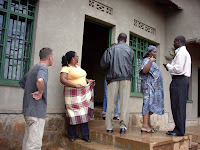
The first thing I noticed when I stepped out of the airport at Kigali was the green-ness of Rwanda's rainy season. I was told that the place looks completely different at other times of the year. When I commented that Rwanda lived up to its reputation as the land of a thousand hills, my host said it was known as the land of "a thousand hills, a thousand problems". It didn't seem fair to me that such a beautiful place should be known only for these "problems" that were brought to international attention in a tragic event over ten years ago.
While there's no denying the impact of the genocide on the country, what surprised me was the way that people have dealt with it. While I sit at my desk back in Geneva talking and writing about peacebuilding and the aftermath of mass atrocities, the people I met are living these realities. On my first day in the country, the car I was in was stopped by armed soldiers. They looked very young to me, and it was my first experience of small arms up close.
 I was welcomed by Quakers in Kigali and ate a delicious meal at Friends Peace House in the impressive building that was only recently completed. I was inspired to hear that Quaker processes such as the AVP workshops have been adapted for trauma healing work and that people have seen the results as they begin to heal hurts, forgive, and rebuild their communities.
I was welcomed by Quakers in Kigali and ate a delicious meal at Friends Peace House in the impressive building that was only recently completed. I was inspired to hear that Quaker processes such as the AVP workshops have been adapted for trauma healing work and that people have seen the results as they begin to heal hurts, forgive, and rebuild their communities.
After a slightly bumpy bus ride to Kibuye, we arrived at a luxurious resort by the lake. Although many people were afraid to swim, I bravely edged in but kept close to the shore. During the meetings, it was others who bravely told their stories, while I tended to listen. It was overwhelming to meet so many people from all over Africa and beyond who are engaged in so many areas of peace work, despite obstacles that they've faced in their lives.

But my time in Rwanda wasn't all serious. The fact that everyone has a story of sadness made their laughter so much more real. Wherever I went, I was greeted with a smile, and the re-commencement of meetings was signalled by the sound of voices lifted in song, rather than a bell. The talent night involved an impressive display of poetry, song, dance and a spectacular African fashion show had all of us in fits of laughter as women, and even one man, strutted their stuff.
While there's no denying the impact of the genocide on the country, what surprised me was the way that people have dealt with it. While I sit at my desk back in Geneva talking and writing about peacebuilding and the aftermath of mass atrocities, the people I met are living these realities. On my first day in the country, the car I was in was stopped by armed soldiers. They looked very young to me, and it was my first experience of small arms up close.
 I was welcomed by Quakers in Kigali and ate a delicious meal at Friends Peace House in the impressive building that was only recently completed. I was inspired to hear that Quaker processes such as the AVP workshops have been adapted for trauma healing work and that people have seen the results as they begin to heal hurts, forgive, and rebuild their communities.
I was welcomed by Quakers in Kigali and ate a delicious meal at Friends Peace House in the impressive building that was only recently completed. I was inspired to hear that Quaker processes such as the AVP workshops have been adapted for trauma healing work and that people have seen the results as they begin to heal hurts, forgive, and rebuild their communities.After a slightly bumpy bus ride to Kibuye, we arrived at a luxurious resort by the lake. Although many people were afraid to swim, I bravely edged in but kept close to the shore. During the meetings, it was others who bravely told their stories, while I tended to listen. It was overwhelming to meet so many people from all over Africa and beyond who are engaged in so many areas of peace work, despite obstacles that they've faced in their lives.

But my time in Rwanda wasn't all serious. The fact that everyone has a story of sadness made their laughter so much more real. Wherever I went, I was greeted with a smile, and the re-commencement of meetings was signalled by the sound of voices lifted in song, rather than a bell. The talent night involved an impressive display of poetry, song, dance and a spectacular African fashion show had all of us in fits of laughter as women, and even one man, strutted their stuff.
No comments:
Post a Comment